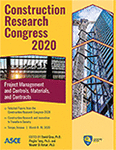Construction Research Congress 2020
Industry Feedback on Implementing Pull Planning in the Construction Industry
Publication: Construction Research Congress 2020: Project Management and Controls, Materials, and Contracts
ABSTRACT
Pull planning is a collaborative approach that is used to develop a project-based production plan in compliance with principles of lean construction. Pull planning is a process of working backwards from a planned milestone to generate a project schedule or schedules. With the use of pull planning, project teams are able to evaluate and develop project schedules in collaborative ways that allow them to rely on the results and encourage buy-in to the project’s success. This paper focuses on verifying benefits and obstacles of implementing pull planning in the construction industry using a survey of industry professionals. The gathered feedback of industry professionals is used to validate priority guidelines to promote the use of pull planning. The prioritized guidelines include (1) getting people on board early by choosing the right delivery method; (2) identifying the right people to be in the room by providing transparent expectations early to trades regarding foremen and superintendent involvement; (3) providing adequate time for planning by accounting for it early on, and after each session; and (4) defining scope areas by narrowing the breadth of planning sessions. The primary contribution of this research is validation of industry feedback to the recommendations provided by the body of research and documentation of the current use and promotion of pull planning in the construction industry.
Get full access to this article
View all available purchase options and get full access to this chapter.
REFERENCES
AlNasseri, H., and Aulin, R. (2015). “Assessing Understanding of Planning and Scheduling Theory and Practice on Construction Projects.” Engineering Management Journal, Taylor & Francis, 27(2), 58–72.
AlSehaimi, A. O., Fazenda, P. T., and Koskela, L. (2014). “Improving construction management practice with the Last Planner System: a case study.” Engineering, Construction and Architectural Management, 21(1), 51–64.
Ballard, G., and Tommelein, I. (2016). “Current Process Benchmark for the Last Planner System.” Lean Construction Journal, 89, 57–89.
Bhargav, D., Hamalainen, J.-P., Kemmer, S., Koskela, L., and Koskenvesa, A. (2015). “Suggestions To Improve Lean Construction Planning.” Proceedings for the 23rd Annual Conference of the International Group for Lean Construction, Perth, Australia, 29–31.
Ćwik, K., and Rosłon, J. (2017). “Last planner system in construction.” MATEC Web of Conferences, S. Jemioło, A. Zbiciak, M. Mitew-Czajewska, M. Krzemiński, and M. Gajewski, eds., EDP Sciences, 1–4.
Daniel, E. I., Pasquire, C., Dickens, G., and Ballard, H. G. (2017). “The relationship between the last planner® system and collaborative planning practice in UK construction.” Engineering, Construction and Architectural Management, 24(3), 407–425.
Falk, S. (2017). “Pull Planning: How Lean Construction Practices Can Improve Projects.” eSub, <https://esub.com/pull-planning-how-lean-construction-practices-can-improve-project-efficiency/> (Nov. 1, 2017).
Koo, B., Fischer, M., and Kunz, J. (2007). “A formal identification and re-sequencing process for developing sequencing alternatives in CPM schedules.” Automation in Construction, 17, 75–89.
“LCI Co-Founder Glenn Ballard on the Last Planner System.” (2017). Irish Building Magazine, 56–57.
McConaughy, T., and Shirkey, D. (2013). “Subcontractor Collaboration and Breakdowns in Production: The effects of varied LPS implementation.” 21st Annual Conference of the International Group for Lean Construction 2013, IGLC 2013, Fortaleza, Brazil, 649–658.
Mossman, A. (2015). Last Planner: 5+1 crucial & collaborative conversations for predictable design & construction delivery.
Munje, A. S., and Patil, D. S. (2014). “Comparative Study of Last Planner System Over Traditional Construction Processes.” Current Trends in Technology and Science, 3(4), 308–311.
Al Nasseri, H. A., Widen, K., and Aulin, R. (2016). “A taxonomy of planning and scheduling methods to support their more efficient use in construction project management.” Journal of Engineering, Design and Technology, 14(3), 580–601.
Pavez, I., and González, V. (2012). “Social Dynamic of Improvement when Using the Last Planner System: A Theoretical Approach.” Proceedings of the 20th Annual Conference of the International Group for Lean Construction, 1–10.
Information & Authors
Information
Published In
Construction Research Congress 2020: Project Management and Controls, Materials, and Contracts
Pages: 515 - 524
Editors: David Grau, Ph.D., Arizona State University, Pingbo Tang, Ph.D., Arizona State University, and Mounir El Asmar, Ph.D., Arizona State University
ISBN (Online): 978-0-7844-8288-9
Copyright
© 2020 American Society of Civil Engineers.
History
Published online: Nov 9, 2020
Published in print: Nov 9, 2020
Authors
Metrics & Citations
Metrics
Citations
Download citation
If you have the appropriate software installed, you can download article citation data to the citation manager of your choice. Simply select your manager software from the list below and click Download.
